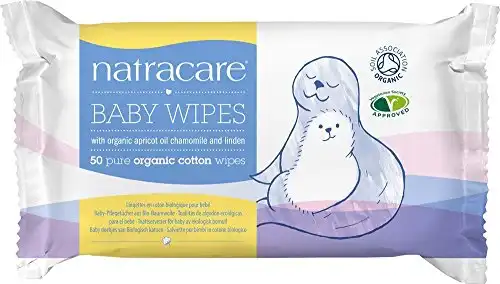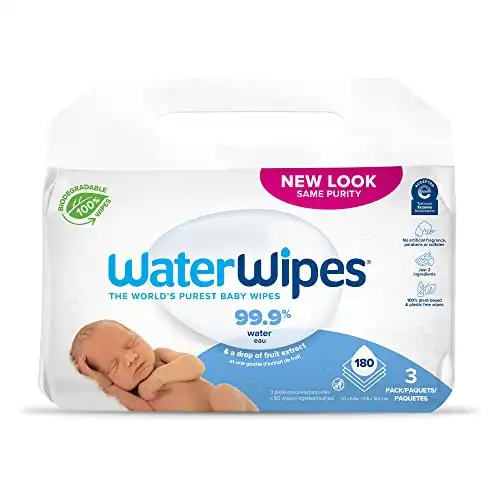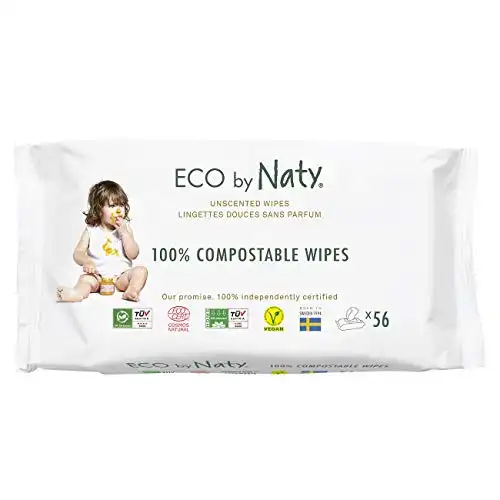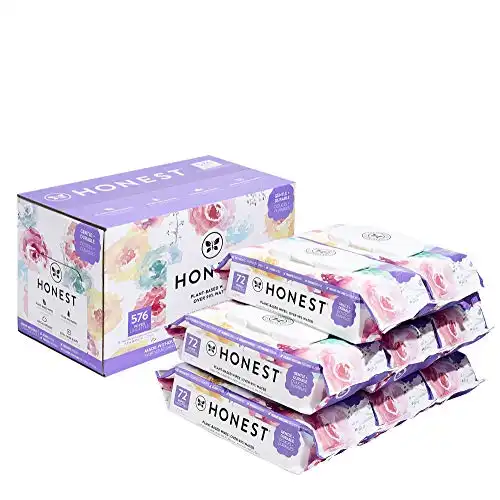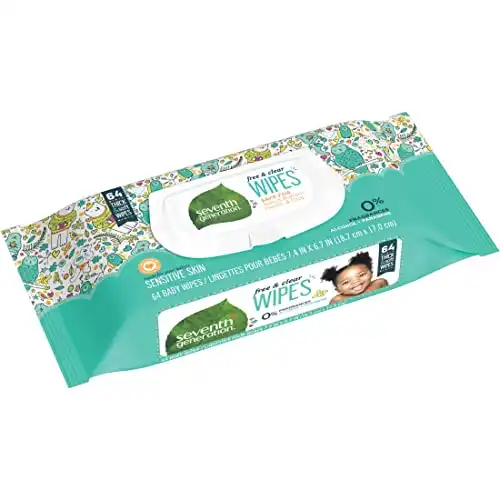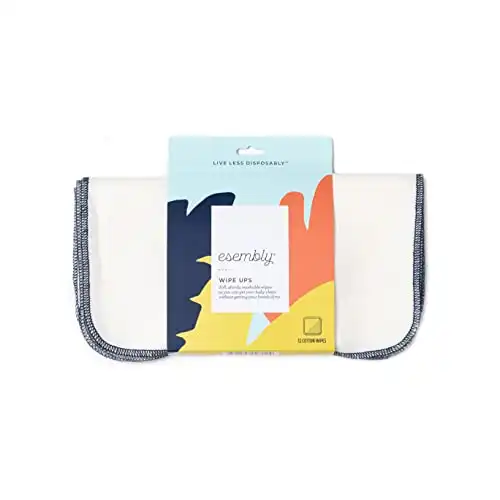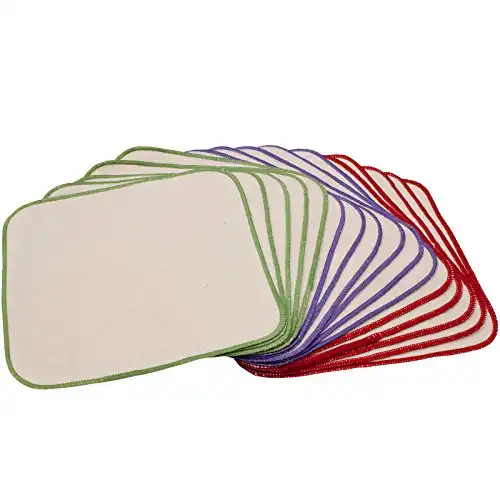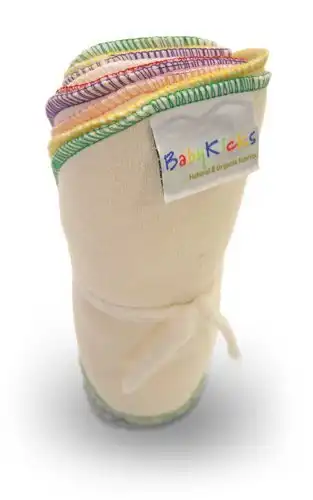- You are here:
- Home »
- Non Toxic Nursery »
- Best Non-Toxic and Natural Baby Wipes
Best Non-Toxic and Natural Baby Wipes
In this article, we’ll explore some of the best non-toxic and natural baby wipes available on the market today. Not only are these wipes more gentle on your baby’s delicate skin, but they also help to keep dangerous chemicals away from your little one.
Disclaimer: As an Amazon Associate I earn from qualifying purchases.
Natracare Natural Baby Wipes
These natural baby wipes provide a safe and gentle solution for quick clean-ups. They are certified organic and made with 100% cotton that is totally chlorine-free, making them an ideal choice for those looking to avoid harsh chemicals.
To add to the quality of these wipes they also contain organic essential oils, making them pleasant to use. Natracare Natural Baby Wipes are good for your baby’s skin and the environment as they are biodegradable and suitable for vegans.
WaterWipes
Made with 99.9% water and a drop of fruit extract, these wipes are perfect for cleaning your baby’s delicate skin and leaving it feeling soft and smooth. They’re made with no alcohol, perfumes, fragrances, parabens, or any other irritants that can harm your child’s sensitive skin.
Made using 100% green energy, WaterWipes are also hypoallergenic, making them ideal for babies with sensitive skin. As they’re fully biodegradable and plastic-free, these wipes are also an environmentally friendly choice.
Eco by Naty Compostable Wipes
These non-toxic baby wipes are made of 100% natural, ultrathin fibers, they’re both soft and biodegradable, making sure that no harm is caused to our delicate environment. Best of all, not only are they free of irritants and allergens thanks to their hypoallergenic nature, but their plant-based fibers and pure water content mean that you can now compost them at home in just a mere 12 weeks!
With independent certification from Ecocert COSMOS and OK Biobased TÜV confirming their organic origins without any synthetics or chemicals – Eco by Naty’s Compostable Wipes are the perfect choice for your family and our planet.
Bambo Nature Tidy Bottoms Baby Wipes
These wipes are biodegradable and made from natural and renewable materials, like bamboo fiber and cotton. They are first baby diapers certified with the Nordic Swan Ecolabel, as they’re made using 100% wind energy.
These cruelty-free baby wipes are free from perfumes, parabens, dyes, optical brighteners, and chlorine, so you can be sure your baby is getting only the best. However, we don’t like the fact that Bambo Nature Tidy Bottoms Baby Wipes are not biodegradable.
The Honest Company Clean Conscious Wipes
These natural baby wipes have everything you need to keep your little one safe and clean! Each environmentally friendly wipe is made from 100% plant-based materials, plus over 99% water – so you don’t have to worry about any unnecessary harsh chemicals or fragrances.
They’re extra large, thick and soft while also being gentle and durable – perfect for even the most delicate of baby’s skin. As an added bonus, they’ve even been certified by the National Eczema Association with their Seal of Approval, so parents can be confident that these wipes are just right for their little one.
Plus, they never test on animals, meaning you can use Honest Company’s Clean Conscious Wipes with a conscience knowing that your fuzziest friends were not harmed in making these wipes.
Seventh Generation Free & Clear Baby Wipes
These wipes are made with plant-based ingredients and free from harsh chemicals like chlorine, parabens, phthalates, fragrances, and dyes. They’re also hypoallergenic and perfect for babies with sensitive skin.
They’re very moist and thick, so you’ll need to use fewer wipes for every diaper change. However, Seventh Generation Free & Clear Baby Wipes are not compostable nor biodegradable, so they’re not the most eco-friendly option.
How About Reusable Baby Wipes?
You can also consider using organic organic reusable baby wipes and water. It means that you’ll always have to carry a special foaming wash or reusable water bottle and a set of wipes along with a sealable reusable bag for dirty wipes, but it’s a great way to keep your baby clean in an eco-friendly and natural way. Take a look at the following options:
Esembly Wipe Ups
Made of 100% certified organic cotton, these wipes are super-soft, fragrance-free, chlorine-free, and chemical-free. Not just gentle on your baby’s skin either – it’s also sturdy and generously sized to handle any mess or surprise blowout.
Just pump a few pumps of their Foaming Wipe Up Wash onto a fresh wipe (sold separately), clean up baby’s bottom, and toss the used Wipe Up into the bag with your soiled diapers for laundering. Best of all, only 2-4 packs of Esembly Wipe Ups are all you’ll need from birth through potty training.
OsoCozy Baby Wipes
OsoCozy baby wipes are must-have items for every parent. Crafted from 100% cotton flannel and with a single-layer fabric design, these wipes provide durability and softness. Plus, drying quickly and measuring eight-by-eight inches, you’ll always have one handy in your purse or car for any emergency.
And when you’re done using them, they’re easy to wash along with your regular laundry or cloth diapers! Whether you use them when changing your baby’s diaper during outings or throughout the day, OsoCozy Baby Wipes will give your child the gentle care they deserve.
BabyKicks Organic Baby Wipes
Carefully handmade with natural hemp and certified organic cotton fleece, these versatile oval-shaped wipes will help keep your little one clean.
Use them as a baby washcloth, to wipe little bottoms, or just about anything else in between! With BabyKicks Organic Baby Wipes, you can rest assured knowing that they are gentle on your baby’s delicate skin, while getting the job done.
Toxic Ingredients to Avoid in Baby Wipes:
Baby wipes are a convenient way to keep your baby clean and dry, but they can also contain harmful ingredients that can be irritating to your baby’s skin. Some of the most common toxic ingredients found in baby wipes include:
Fragrances
Many baby wipes are scented with artificial fragrances that can dry and irritate your baby’s skin. These synthetic fragrances include phthalates, which are linked to endocrine disruption and a whole host of other health problems. Always choose fragrance-free baby wipes.
Alcohols
Alcohols such as ethyl alcohol, isopropyl alcohol, and benzyl alcohol can damage your baby’s skin. Alcohol in wipes is used to prevent bacteria growth, but you can find non-toxic wipes that use natural preservatives like vitamin E or citric acid to keep bacteria away.
Parabens
Parabens are preservatives that are used to extend the shelf life of products. The common parabens used in baby wipes are butylparaben, ethylparaben, methylparaben and propylparaben.
These prevent bacteria from growing in the wipes so that they last longer. They can be absorbed through the skin and linked to hormone disruption and cancer.
PEGS
PEGS are synthetic compounds that increase the skin’s ability to absorb other ingredients, making them more effective. They are commonly used in skincare products, cosmetics, and baby wipes.
While PEGs can help enhance a product’s effectiveness, they can also be potential hazards, especially if used on irritated skin, for example, if your baby has a nappy rash. PEGS can cause skin irritation and even be contaminated with ethylene oxide or 1,4-dioxane, both known carcinogens.
Sodium lauryl sulfate (SLS)
SLS is a foaming agent and surfactant often used in shampoos, body washes, soaps, and other personal care products. It is a known irritant and can cause skin irritation, redness, and inflammation.
It can also strip the skin of its protective oils, leaving it dry and irritated. Studies have shown that SLS has the potential to penetrate deep into the skin, allowing toxins and other contaminants to enter the body.
Formaldehyde
Formaldehyde is a preservative used to extend the shelf life of products. It has been linked to cancer and other health problems. Although you may not find formaldehyde on the ingredient list, there are many formaldehyde-realizing ingredients that you should avoid. These include quaternium-15, imidazolidinyl urea, and diazolidinyl urea.
FAQs
What is the difference between reusable and disposable wipes?
A: Cloth wipes are made of absorbent material such as cotton, muslin, or bamboo. They’re reusable and can be washed in the washing machine after use.
Disposable wipes are single-use and generally contain chemicals like fragrance and alcohol that can be irritating to sensitive skin. Cloth wipes make a great eco-friendly alternative to disposable wipes.
How to use reusable wipes?
A: Reusable cloth wipes are one of the best eco-friendly products to use at home! To use them, simply wet the cloth with water and use it as you would a regular disposable wipe. If you want to use them outside, always carry a reusable water bottle and a reusable sealable bag for your dirty cloth wipes.
When you’re done, simply toss the used wipe in your sealed bag and rinse out the bag when you get home. This will help to keep your cloth wipes hygienic and ready to use again!
Are cloth wipes better than disposable wipes?
A: Cloth wipes are definitely a better alternative to disposable wipes. They’re reusable, eco-friendly, and free of toxic chemicals. Plus, they are much gentler on your baby’s skin since they don’t contain any fragrances or alcohol that can be irritating. So make the switch to cloth wipes today and help reduce your family’s environmental impact!
How do I store reusable wipes?
A: Cloth wipes should be stored in a dry, sealed container or bag. This helps keep them free of bacteria and makes them easier to transport when you’re on the go. When washing the wipes, make sure to use a mild, unscented detergent and avoid fabric softener. After washing, simply let the wipes air dry and they will be ready to use again.
How often should I wash my cloth wipes?
A: It is recommended that you wash your cloth wipes after every use so they remain hygienic. You can also wash them in batches every couple of days if needed. Just make sure to use a mild, unscented detergent and avoid fabric softener.
Are conventional baby wipes safe to use?
A: Unfortunately, conventional baby wipes are not always safe for sensitive skin. They often contain chemicals like alcohol, fragrance, and preservatives that irritate the skin. It’s best to opt for natural or organic wipes instead. These will be free of harsh chemicals and gentler on your little one’s delicate skin.
What is the best way to dispose of used wipes?
A: The best way to dispose of used baby wipes is to put them in the trash. Unfortunately, most sewage systems are not designed to handle wet wipes, so they can clog pipes and cause major plumbing issues. To be on the safe side, make sure to always put used wipes in the trash.
Are baby wipes biodegradable?
A: While some baby wipes are biodegradable, most are not. To be sure that you’re using a biodegradable wipe, look for the “biodegradable” label on the package. This will ensure that your used wipes won’t harm the environment! We always recommend opting for eco-friendly, biodegradable wipes whenever possible.
Are flushable baby wipes really flushable?
A: Unfortunately, no. Even though they may be labeled as “flushable”, most baby wipes are not actually safe to flush down the toilet. They can cause clogs and damage to pipes and sewage systems, so it’s best to avoid flushing them at all costs! Instead, put used wipes in the trash to keep your plumbing safe.
What’s the difference between unscented and fragrance-free baby wipes?
A: Fragrance-free baby wipes are typically made without synthetic fragrances or perfumes, while unscented baby wipes may contain chemicals that neutralize the smell of other ingredients. Unscented products could still be scented with natural essential oils, but these will be clearly labeled on the packaging so you know what you’re getting.
Fragrance-free baby wipes are usually the best option for those with sensitive skin, as they won’t contain any potentially irritating chemicals that could cause a reaction. However, unscented products can also be gentle and safe to use on your baby’s delicate skin. Both types of wipes should be labeled “hypoallergenic” to ensure they are safe for sensitive skin.
Conclusion
Non-toxic baby wipes are not easy to find, but they are worth the effort. With so many potential chemicals and toxins in conventional products, it is important to make sure you are using baby wipes that are safe for your little one’s delicate skin. Non-toxic baby wipes help keep infants away from the potentially harmful substances found in traditional wet wipes.
They are an easy and convenient way to keep your baby clean and happy without worrying about their health. Another completely chemical-free option are cloth wipes, which you can be used with water. While they may take more effort to use, they are both cost-effective and eco-friendly. We hope this guide has helped you find the best non-toxic baby wipes for you and your family!
About the Author Kamila Flieger
My name is Kamila, and I'm passionate about researching non-toxic, organic products for the home. I believe it's so important to create a safe and healthy environment for our families, and I enjoy helping others do the same.

